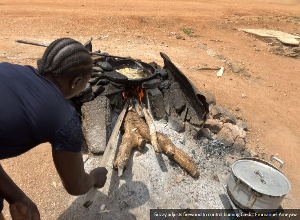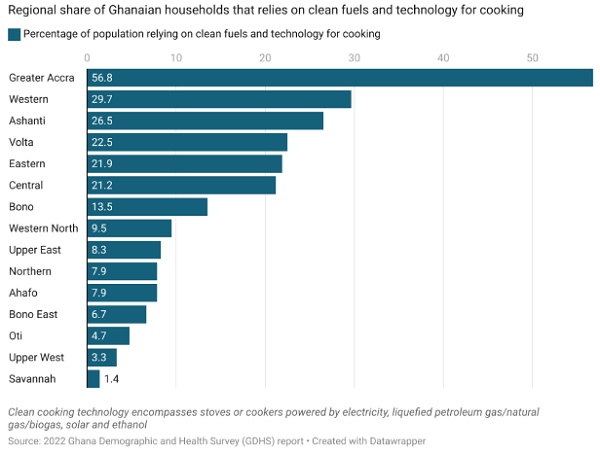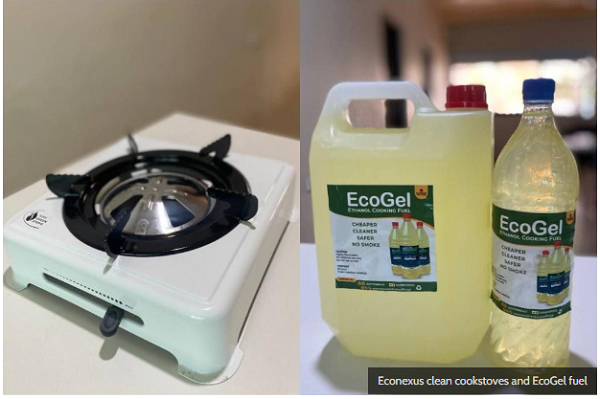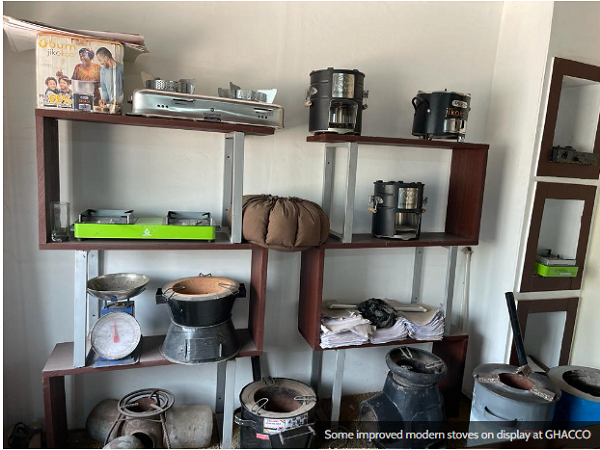 Suzzy adjusts firewood to control burning Credit: Emmanuel Ameyaw
Suzzy adjusts firewood to control burning Credit: Emmanuel Ameyaw
On a busy morning Suzzy Klemefe, drops pieces of cut yam in hot cooking oil watching as they sizzle and sputter. Two customers are waiting on the fried yams and fish for which she has become known here in this farming community. “Auntie Suzzy” as she is affectionately called has been cooking for happy customers for 23 years.
Like many women across Ghana Suzzy relies on firewood and charcoal to cook. She has built a traditional cookstove with carefully arranged stones, cement bricks and an old roofing sheet to shield against wind. Her discoloured cooking utensils and smoggy cooking area hint at the silent menace that is plaguing her health.
Suzzy knows something is not right. Long hours spent cooking often leave her with a burning sensation on her skin, she says, shortness of breath and other ailments.
“As for my health, it is a worry,” Suzzy says between customers. “I sometimes experience headaches but I drink blood tonic and I feel okay. I think every job has health impacts, even those who sit in the office have bigger health issues.”
Several entrepreneurs in Ghana have introduced clean cooking technologies. Some rely on gas, a cleaner fuel, instead of heavily polluting wood or charcoal. Suzzy tried one but found it wasn’t worth the cost.
“I used to cook with gas and it ran out every three days so I switched to firewood,” Suzzy says.
For generations, women like Suzzy have used traditional cookstoves. In Ghana cooking is seen as women’s work and the majority of women spend long hours toiling over toxic smoke and pollutants from burning firewood, charcoal, and other biomass.
It is taking a toll. There is no reliable data available for Ghana but the World Health Organization found household air pollution was responsible for an estimated 3.2 million deaths around the world in 2020, including more than 237,000 children under the age of 5.
Dr Nii Odartei Ashong-Lamptey, a physician at the Ghana Infectious Disease Center, says the burning of biomass releases carbon dioxide, nitrates, carbon monoxide and other chemicals. He says long-term exposure to fumes from traditional cooking can lead to lung diseases like pneumonia and asthma. The smallest particles can enter the victim’s bloodstream causing heart disease, stroke, diabetes, blindness, infertility, and worse.
“Cancers can be triggered by the introduction to all these hydrocarbons which can be carcinogenic which means they can lead to cancer formation,” Dr Ashong-Lamptey says.
It’s not just adults who are at risk. When pregnant women are exposed to pollutants their unborn babies suffer too.
“Children may develop birth defects based on the fact that they are getting a lot of those chemicals into their system,” Dr Ashong-Lamptey says. “It could lead to cognitive impairment, low birth weight, and stillbirth.”
Ghanaians are still heavily reliant on dirty cooking fuels. More than three in every four Ghanaian households use solid fuels for cooking. Access to clean cooking technologies shows extreme inequality between rural and urban households. More than half of Accra households have access to clean cooking fuel and technology. In the Savannah region, only 1.4 percent had that access.
Education and class are key factors in the shift to clean cooking. Ghanaians with higher levels of education and those working in formal sector jobs are more likely to use clean cookstoves.
Data on clean cooking in Ghana

Ghanaian Innovation Brings Clean Cooking
Many ventures around the world have tried to make cooking cleaner. In Ghana, three friends teamed up to tackle the problem in 2018 with new technology. Prince Essel, Patience Alifo, and Queenstar Ablorh’s personal experiences sparked their social enterprise Econexus Ventures. Prince and Patience met at the African Climate Week in Accra where they outlined their partnership on creating clean cooking technology. Queenster joined the team as they pitched their project during an incubation program – the Africa Energy Generation Prize in Togo.
Prince’s journey was inspired by a major event that shaped his childhood: his grandmother was bitten by a snake while gathering firewood to prepare a meal for young Prince’s pregnant mother. This incident caused great distress to the family as Prince’s grandmother was hospitalized for some days. For Patience, the trigger was a fire outbreak caused when a Liquefied Petroleum Gas cook stove ignited and razed her best friend’s home and injured her family.
“We were both enraged about these sudden events happened to people who are close to us,” Prince says. “I had thoughts around coming up with a more safe, affordable, and reliable clean cooking technology.”
Their resolve to develop clean cooking technology began at the Africa Climate Week. They settled on multiple fuels and stove products. For fuel they chose bio-ethanol after finding it was cheaper, more efficient, and eco-friendly.

Econexus now offers two fuel products – ECOGEL, a non-pressurized ethanol gel fuel, and ECOFUEL, an evaporative liquid ethanol fuel. Both fuels are developed from the byproducts of pineapples, cashews, apples, and sugarcane.
They also sell clean cookstoves that are used with their clean fuels. Econexus currently produces the Ecofuel stove, an evaporation stove for households. The Ecofuel stove has wool enclosed in a container and a lid that securely holds evaporative liquid fuel for burning. It has a regulator knob for adjusting temperature. They also produce a Gel Ethanol stove for large-scale commercial cooking. The Gel Ethanol stove burns the organic fuel from a combustion chamber with a choke adjuster to regulate the flame.
Business is still small. Econexus produces 1500 liters of fuel a week with a customer base of more than 500 households. They have six regional stores in Bibiani, Tarkwa in the western region, and Ho in the Volta Region. To win customers over the team engaged in constant public education and practical demonstrations at markets, trade fairs, and exhibitions.
“We are at the intersection where people are looking for alternatives that are affordable, reliable, clean, and safe. LPG is a cleaner fuel than petroleum but it, like petroleum, is imported meaning the price is dependent on fluctuating global markets. Ecogel fuels are Ghanaian-made and cost less,” says Prince. “About 65 to 70% of our current customer base are people who were using LPG and now find our fuel – Ecogel to be safe because it burns calmly.”
Clean cooking has advantages that go beyond just people’s health. It also “frees up time for women and girls, who are generally given the job of cooking,” and waste time searching for firewood and charcoal, according to Dr. Yaw Agyeman Boafo, Senior Research Fellow at the Center for Climate Change and Sustainability Studies. “If there are accessible, affordable clean cooking options, it will lead to less health concerns among women and promote gender equality and also economic empowerment for women.”
Mohammed Aminu Lukumanu, Chief Executive Officer for the Ghana Alliance for Clean Cookstoves, an industry group, agrees.
“If it is firewood, it is a burden on the woman to collect it. As you move to clean fuels, the burden is shared. You will find men carrying cylinders to go and buy gas and the expenditure doesn’t fall on the woman alone,” Lukumanu says. “Even the burden to cook, if it is a rice cooker or electric cooker you may find men also cooking or warming their food. The more we introduce these clean cooking technologies, the more we are able to reduce the unpaid hours and the burden on women.”
The benefits of clean cooking are extensive. Another key benefit is the protection of forests and biodiversity that are being destroyed as forests are cut down for charcoal. Protecting biodiversity is key to protecting Ghana’s soil fertility and wildlife. Protecting forests helps soak up the greenhouse gases causing climate change.
Challenges and Triumphs: Navigating the Path Forward
Despite the many benefits Ghanaians have been reluctant to take up cleaner cooking methods. Experts say that is in part because of low awareness of the dangers of traditional cooking. People are also used to the flavor of traditionally cooked food.
But the biggest challenge is cost. Clean cooking entrepreneurs continue to grapple with a lack of access to financing. Ghana’s clean cooking sector is largely funded by donors. There is little interest from investors. Without more investment, prices will stay high, says Prince of Econexus and the sector’s growth will be limited.
Lovan Owusu-Takyi, Chief Executive Officer of Sustainable Energy Technology, another Ghanaian social enterprise developing clean cooking technologies, agrees most potential customers cannot afford their product despite their genuine interest.
To make stoves affordable, his organization rents clean stoves to women. They pay an initial amount of less than GHC40 and can then pay the remaining amount in installments.
Providing new methods of financing clean cooking like this will be key, says Dr Boafo.
“The initial cost of clean cookstoves and recurring cost of cleaner fuels are prohibitive for many families,” he says. “In rural areas, if you spend GHC 50 to refill your clean cookstoves, it’s a lot of money and this is a real challenge for many households even sometimes in urban areas.”
Future Prospects: Scaling Up and Sustainability
Since its inception in 2012 the Ghana Alliance for Clean Cooking, a network of stakeholders promoting clean cooking has distributed more than two million clean cookstoves across Ghana. To improve accessibility, they subsidize the cost of clean cookstoves for rural communities. Women can pay as low as GHC1 to get a clean cookstove and the remaining amount is paid in installments. The distribution is funded by grants from international donors.

Alliance chief Lukumanu would like to see the government develop policies to push industry and households to take up clean cooking techniques. He wants to see local solutions with programs and policies that reflect the realities on the ground.
Dr. Boafo is urging the government to lift awareness by including clean cooking in Ghana’s educational curricula. He says more women must lead the clean cooking revolution.
For Suzzy Klemefe and millions of women across Ghana, their livelihoods and health could depend on the fledgling clean cooking industry getting the jumpstart it needs.
This story was a collaboration between The Climate Insight and New Narratives. Funding was provided by the Clean Air Fund. The funder had no say in the content of the story.